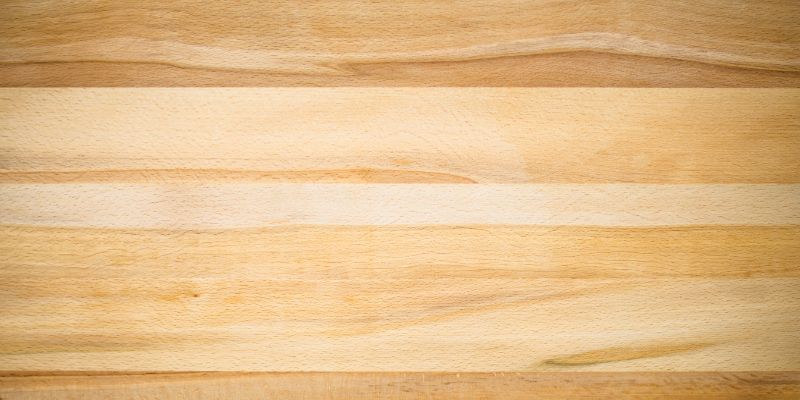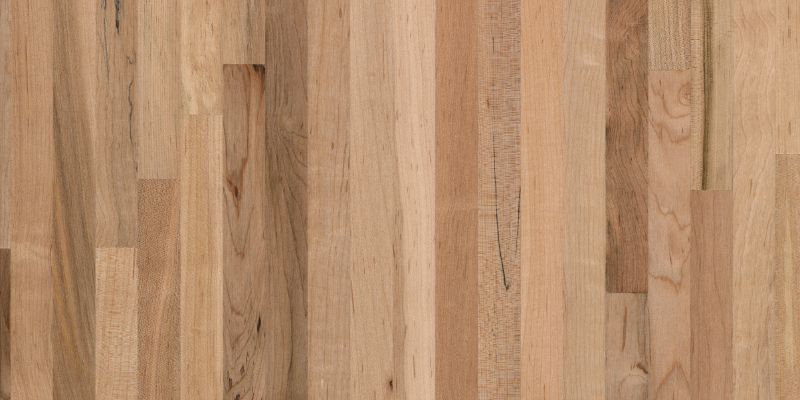Yes, birch is good for butcher blocks due to its durability and resistance to scratches and dents. Birchwood is a popular choice for butcher block countertops and cutting boards because of its strength and sturdiness.
It has a tight grain pattern which makes it resistant to scratches and dents, making it an ideal surface for chopping and cutting. Birch also possesses natural antimicrobial properties, which help to prevent the growth of bacteria and keep the surface hygienic.
Furthermore, it is easy to maintain and can be sanded and resealed when necessary. Its light color and warm undertones give a timeless and classic look to any kitchen. Overall, birch is an excellent choice for butcher block due to its durability and versatility.
Birch Wood Characteristics
Birchwood is a popular choice for butcher block countertops due to its excellent strength and durability, as well as its beautiful grain and color. When it comes to kitchen countertops, you want a material that can withstand the demands of daily use while also enhancing the aesthetics of your space. Birchwood checks all the boxes, making it an ideal choice for butcher block countertops.
Strength And Durability
Birchwood is known for its remarkable strength and durability, making it an excellent option for butcher block countertops. The wood is hard, dense, and able to withstand the rigors of chopping, slicing, and dicing. It is less prone to denting or scratching compared to softer woods, ensuring your countertop will endure years of use without showing signs of wear and tear. Birch wood’s robust nature provides a reliable and long-lasting surface for your kitchen activities.
Grain And Color
The grain pattern of birch wood is another noteworthy characteristic that makes it a popular choice for butcher block countertops. It features a fine, straight grain that adds an elegant touch to any kitchen design. Birchwood also comes in a range of colors, from light to medium brown, with occasional hints of reddish undertones. This versatility in color allows you to select a shade that complements your overall kitchen aesthetic. Whether you prefer a natural, rustic look or a more modern and sleek design, birch wood offers options that will suit your style.

Pros And Cons Of Birch For Butcher Block
Choosing the right wood for your butcher block is crucial, as it impacts both the performance and aesthetics of your kitchen. One wood option that often comes up is birch, known for its durability and affordability. However, like any other material, birch also has its own set of advantages and disadvantages when it comes to butcher block. In this article, we will explore the pros and cons of using birch for butcher block countertops.
Advantages
There are several advantages to using birch for your butcher block countertops:
- Durability: Birch is a hard and sturdy wood that can withstand heavy use in the kitchen. It resists scratches and dents, making it a great choice for a functional countertop.
- Affordability: When compared to other hardwoods like maple or walnut, birch is a more cost-effective option. You can achieve the same beautiful appearance for a fraction of the price.
- Light Appearance: Birch has a light color with a subtle grain pattern, providing a clean and bright look to your kitchen. It can make a small kitchen feel more spacious and inviting.
- Ease of Maintenance: Properly sealed birch countertops are relatively easy to maintain. Regular cleaning and occasional oiling can keep them looking great for years.
- Availability: Birch is widely available and can be found at many lumberyards and home improvement stores. This makes it more accessible and convenient for those embarking on a kitchen renovation project.
Disadvantages
Despite its many advantages, birch does have some disadvantages when used for butcher block countertops:
- Susceptible to Scratches: While birch is generally durable, it is not as resistant to scratches as harder woods like maple or cherry. Care should be taken to avoid dragging heavy objects across the surface.
- Plain Appearance: The light color and subtle grain of birch may not appeal to those looking for a more dramatic or rustic appearance for their kitchen. If you prefer a more distinct wood grain, birch may not be the best choice.
- Prone to Water Damage: Birch is not naturally resistant to water, and if not properly sealed, it can be prone to water damage. Regular sealing and appropriate maintenance are essential to extend its lifespan.
- Less Natural Variation: Birch tends to have less natural color variation than other hardwoods, which may be seen as both an advantage and a disadvantage. Some may prefer a more uniform look, while others appreciate the unique patterns found in other woods.
- Not Heat Resistant: Birch is not heat resistant, and hot objects should not be placed directly on the surface. The use of trivets or hot pads is necessary to protect the wood from burns or discoloration.
In summary, birch can be a good choice for butcher block countertops due to its durability, affordability, light appearance, and ease of maintenance. However, its susceptibility to scratches, plain appearance, and vulnerability to water damage should also be taken into consideration. Ultimately, the decision depends on your personal preferences and the specific requirements of your kitchen.
Comparison With Other Wood Options
When it comes to butcher block, the type of wood used is a crucial factor to consider. Birch is commonly used for butcher block, but how does it compare to other wood options such as Maple and Oak? Let’s take a closer look at the comparison with these two popular wood choices.
Maple
Birch and Maple are both durable hardwoods, and they share similar characteristics such as hardness and resistance to wear and tear. However, Maple tends to have a lighter color and a smoother grain pattern compared to Birch. This makes it a popular choice for those seeking a lighter, more uniform look for their butcher block.
Oak
Oak is another popular wood option for butcher block, known for its durability and distinctive grain patterns. While Birch and Oak both offer excellent strength and durability, Oak tends to have a stronger grain pattern and a more prominent texture. This can be appealing to those looking for a more rustic or traditional aesthetic for their butcher block.
Maintaining Birch Butcher Block
Cleaning And Care
To keep your birch butcher block looking its best, regular cleaning and care are essential. Here are some simple steps to follow:
- Wipe Clean: After each use, wipe down the surface of the butcher block with a damp cloth or sponge to remove any spills or food particles. Avoid using harsh chemicals or abrasive cleaners as they can damage the wood.
- Gentle Soap: For tougher stains, mix a gentle soap in warm water and gently scrub the affected area with a soft brush or sponge. Rinse thoroughly and dry with a clean towel.
- Drying: To prevent warping or cracking, ensure the butcher block is thoroughly dried after cleaning. Use a clean towel or allow it to air dry completely before storing or using it again.
- Oil Treatment: Regularly applying a food-grade oil, such as mineral oil or butcher block oil, helps maintain the beauty and integrity of the birch wood. Apply a thin, even layer of oil to the surface and let it absorb for a few hours or overnight. Wipe off any excess oil with a clean cloth.
Preventive Maintenance
Proper preventive maintenance can extend the life of your birch butcher block. Here are some guidelines to follow:
- Avoid Excessive Moisture: Birchwood is sensitive to moisture, so it’s essential to keep it dry. Wipe up spills immediately and avoid placing hot or wet items directly on the butcher block surface.
- Use Cutting Boards: To prevent scratches and nicks, always use a cutting board when chopping or slicing on the butcher block. This helps protect the surface and keeps it in pristine condition.
- Avoid Harsh Chemicals: Harsh chemicals and cleaning agents can damage the wood and strip away its natural oils. Stick to gentle, natural cleaners and avoid using bleach or other abrasive substances.
- Regular Inspection: Periodically inspect your birch butcher block for any signs of wear or damage. If you notice deep scratches or cracks, consider sanding and resealing the surface to restore its appearance and strength.
Design And Aesthetics
When it comes to choosing the perfect material for a butcher block countertop, design and aesthetics play a crucial role. Birchwood, known for its natural beauty and versatility, is an excellent choice. Let’s explore how birch can enhance the design and aesthetics of your kitchen.
Versatility
Birch is a highly versatile wood that can effortlessly complement various kitchen styles. Whether you prefer a rustic farmhouse look or a sleek modern design, birch can adapt to your preferences. Its light color and fine-grain pattern add a touch of elegance to any space.
Integration In Kitchen Decor
The beauty of birch lies in its ability to seamlessly integrate with any kitchen decor. Its neutral color is a perfect canvas for showcasing other design elements. Pair the warm tone of birch with a vibrant backsplash or colorful cabinet doors to create a striking visual contrast.
If you’re aiming for a cohesive and unified look, birch can serve as a timeless backdrop. Its understated charm enhances the overall aesthetics of your kitchen without overpowering other elements. Additionally, birch can be stained, allowing you to customize the color to match your desired color scheme.
Moreover, birch has a smooth and even texture, making it easy to clean and maintain. This wood is durable, ensuring your butcher block countertop remains attractive and functional for years to come.
Consider the following benefits of birch wood in terms of design and aesthetics:
| BENEFITS |
|---|
| – Natural beauty and fine grain pattern |
| – Versatility in blending with different kitchen styles |
| – Neutrality for showcasing other design elements |
| – Customizability with staining |
| – Smooth and easy-to-clean texture |
| – Long-lasting durability |
Elevate your kitchen’s design and aesthetics with birch butcher block countertops. The natural beauty and versatility of birch wood will enhance the overall ambiance of your space, while its integration in various kitchen decors ensures a timeless and appealing look.

Frequently Asked Questions On Is Birch Good For Butcher Block
Does Birch Make A Good Butcher Block Countertop?
Yes, birch makes a good butcher block countertop as it is durable, affordable, and has a smooth surface perfect for cutting.
Is Maple Or Birch Better For Butcher Block Countertops?
Maple and birch are both excellent choices for butcher block countertops. Each has unique qualities; maple is harder and more durable, while birch offers a lighter appearance. Ultimately, the better option depends on your personal preferences and needs.
Is Birch Butcher Block Food Safe?
Yes, birch butcher block is food-safe as it is a natural and non-toxic material. The smooth surface prevents bacteria buildup, making it suitable for food preparation.
What Is The Best Wood To Use For Butcher Block?
The best wood for butcher blocks is hard and durable, such as maple, walnut, cherry, or oak. These woods resist cuts and scratches while being safe for food preparation. They also provide a beautiful natural appearance for your kitchen.
Conclusion
Birch is a great option for butcher block. Its durability, affordability, and attractive appearance make it a popular choice for kitchen countertops and cutting boards. With proper care and maintenance, birch butcher block can last a lifetime, providing a natural and timeless addition to any kitchen.


